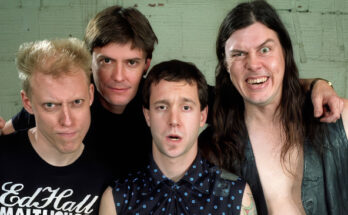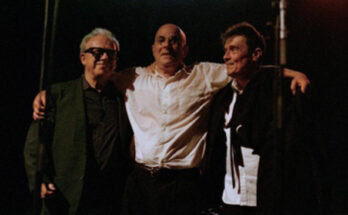By Lee Valentine Smith – April March is a pop genius. As a musician, she’s heavily influenced by French pop music and the very best of ‘60s baroque, folk and obscure symphonic soundtracks as well as Spector-esque Girl-Group rock and roll. As an animator, she’s worked on the Ren and Stimpy show, Pee Wee’s Playhouse and Madonna’s “Who’s That Girl” video.
She’s probably best known for her incredible catalog of music. Her discography goes back to the late ‘80s with her first band The Pussywillows. At that point, she wasn’t even April March yet. Her early recordings as well as her animation and illustrations are credited to her real name, Elinor Blake. The April March “persona” was born from an idea by one of her Ren and Stimpy collaborators.
Speaking of collaborations – over the years, the busy artist has worked with a number of influential performers from around the world. Brian Wilson, Ronnie Spector, Jack White, Jonathan Richman, LL Cool J, Bertrand Burgalat and Jack White’s new bride Olivia Jean are just a few of the many notables.
Conquering every media platform humanly possible, she’s also the illustrator of “We’re Going To Be Friends” by Jack White (available from Third Man Books) as well as author of the upcoming children’s book “What Do You Do Now?” (coming in 2023 from Penguin/Random House).
Her latest album, In Cinerama, features even more cool collaborations and special guests. The guest list includes Tony Allen, Marilyn Wilson, Andy Paley, Petra and Rachel Hayden, Lola Kirke and producer Mehdi Zannad.
Originally issued last year as a special vinyl-only release for Record Store Day, the initial pressing sold out fast. Occasionally, copies turn up on resale sites with prices ranging from 50 to 100 dollars. But the crafty folks at Omnivore Recordings have wisely given the stunningly diverse album a much-deserved wider release on CD and various streaming platforms with a new vinyl edition hopefully on the way soon.
As we celebrate the month of May, it’s probably a great time enjoy some excerpts from a wide-ranging interview with April March!
I know you were busy during some of the pandemic, but how was it for you personally?
You know, I kind of enjoyed it really because I got a lot of house cleaning done, business-wise and in my house. Also I have two kids, so I liked just being able to more time with them. And I had always wanted to start a consistent meditation practice, and since I had so much time, that happened, too. I don’t think that would’ve happened if there hadn’t been a pandemic. So I mean, I didn’t like what it did to the world. That was hard to take. I remember going to Los Angeles and just seeing even more homeless, so many businesses shut down, places like car washes or motels and just thinking about, everybody’s lost their jobs, and that was hard for me.
Right. It’s been a crazy time.
Yeah. But personally, I did like sort of being sent to my room. It was productive for two years, but I also just really miss, I haven’t been to France now since November of 2019. So, I miss being able to work there, and all my friends and family. But I’m hoping that I’ll be able to resume going over there.
Well, I know that you recorded in Nashville during some of the pandemic era. That was the project with Olivia Jean, right?
Yeah. That was great. They just invited me down to Nashville for a few days, and we recorded that, and we had so much fun and it was great. I just loved the way it came out that because the studio is amazing, like an incredible tape studio and the musicians, everything. It was great, like heaven on earth. Because it was the pandemic, I only was there, or we went down to Third Man just so I could see Third Man, and we shot the video there. I didn’t go anywhere else in Nashville except Third Man and basically Jack’s house.
Well that’s all you need, really. Whose idea was it to do the Palladium EP? Was it a combination of you and Olivia Jean or did Jack White come up with the concept?
I guess Jack was in the studio with Olivia around the time that I did the book with him. So he emailed me and said, ‘Olivia wants to cover “Palladium.” Do you have any tips?’ And I said, ‘She should choose another song.’
That’s a good tip.
Because I was like, or she should just put on her full Queen Latifah and just go for it. Because it’s really, it’s a really, excuse my French. It’s fucking hard to sing. It’s probably the hardest, and Olivia doesn’t speak French. So even if you speak French, it’s really hard to sing. It’s super hard to sing. I mean, that’s the hardest cover to cover, to me.
That was a brave move.
That’s what I said. He was like, ‘Okay,’ so then flash forward, maybe, I don’t know, a year or two later. We were in New York backstage and I said to Olivia, ‘So what happened with Palladium? You didn’t do it?’ Because she gave me her album, it had just come out. She was like, Oh yeah. I still want to do it.’ And I said, ‘Well, I could help you with it.’ I don’t know what I was thinking! I was like, ‘Why don’t we just try and do it together? We’ll just master that thing.’ And then she was like, ‘Yeah, let’s do it.’ And then Jack was like, ‘Yeah, let’s do it.’ And you know, then COVID hit. So then we couldn’t just do it. And then, when we did do it, it was really hard to sing.
As you knew going into it.
Yeah I did, but it was a lot of fun. The funny thing is once we figured out I was going to do it. I then, right after I saw, when Olivia decided we were going to do it, I was in Normandy recording a new album. And the musician that I was working with, his name is Norman Langolff. He’s actually the son of a really famous French producer who collaborated a lot with Serge Gainsbourg. He did an album with Gainsbourg where he did all the music, Serge Gainsbourg just wrote the lyrics. Anyways. So I was with Norman, that’s his dad. I was with Norman. I said, ‘So, I’m going to cover this song. Can you help me with it?’ And he was like, ‘Yeah, let’s give it a whirl.’ He was like, ‘I can’t sing this,’ you know? And he’s a French person! And I asked another French friend, they were like, ‘This is impossible.’ Like, he couldn’t even do it. So I was like, ‘Oh, this is going to be really interesting.’ So I just had to practice and practice, and practice and practice. It took us, I don’t know, we worked on it for a couple hours one afternoon and he was just like, ‘Whoa, this is really a fucking bear.’
Well, I don’t think you’ve met a recording project that you haven’t somehow mastered, and maybe even better than what you thought it was going to turn out to be.
Well, I don’t know. I just do things that I do like a challenge, and it has to be fun and I have to like the people I’m doing it with, and then it’s fine, you know?
Historically, you’ve worked on a lot of collaboration projects. Looking back at your history, it’s all over the place, literally. Literally collaboration from all over the world.
I‘m just very lucky, I have to say.
It’s very enjoyable to hear all your different styles, yet one can always tell it’s you, and that’s hard to do. It’s hard to maintain that identity even though because you’re all over the place. All of these genres, but yet it still has your kind of stamp on it.
But I think that’s also because I don’t… I’ve been asked to do plenty of things that would be even more eclectic, but I just wasn’t really feeling it. So I think I learned pretty early, like in my first band, The Pussywillows, there were a few things we did where I said yes, because I was really young and everybody’s like, “It’s such a great opportunity.” And then I just was in the studio in tears, like, ‘Ugh, I don’t like this. This is not me.’ So I think it’s really easy for me to inhabit something if I like it. And if it makes sense to me.
Obviously your name is not a secret. Is the April March persona a type of character or a mask or something that you had somehow developed, as a sort of auxiliary identity?
I guess it was in the early ’90s, I was working as an animator and I was working on this show, Ren & Stimpy. I had started recording and I wanted to keep my credits separate, like all my animation credits are Elinor Blake. The creator of Ren & Stimpy was like, ‘Well, why don’t you, for your recording, how about April March? That sounds like a pop singer.’
It sure does.
I was like, ‘Okay, that’s a good idea.’ So that’s what I did. And then, because I just kept making things under that name it just stuck. But it wasn’t really… It was really just to keep whatever, the bodies of work separate and then some of the, I don’t know. If you look at credits and things, it’s not usually produced by April March, it’ll be produced by Elinor Blake.
Right.
Or like with the book that I did with Jack, that was not April March, it was Elinor Blake who did the illustration.
I noticed that.
Yeah. And if you were to watch some of these things, I animated on, the credits say Elinor Blake, not April March. Because it’s just separate. And I wrote an article for the New York Times, and that was Elinor Blake who wrote that. So, it’s really just like a credit. That’s really all it is.
Right. I was just wondering if you had made a whole backstory and everything for this “April March” person.
Not really. No, not at all. It’s just me, There’s no wizard behind the curtain or whatever. It’s just little old me.
That’s all you need. But yeah, I’ve often wondered about that. When I first started hearing about you way back when, I thought you were some obscure singer-songwriter from France, a very mysterious figure.
Well, that’s nice. But no, I’m just it. It was really just to keep things separate.
But over the years, you’ve become sort of synonymous with the whole French, ‘60-ish, New Wave-ish world and people sort of lump you into that, no matter what kind of sound you’re making.
Yeah but that’s fine with me. I think it’s just because I’m pre-Internet really, so I made these records, and people weren’t making Ye-Ye covers and nobody really cared about Serge Gainsbourg at that point in America. People weren’t really thinking about that. Even in France, it was the same way. Like in the ’90s, I don’t know if you’ve heard Chrominance Decoder or Triggers, which I did with Bertrand Burgalat?
I have, yes.
When I met him, I don’t know, maybe in ’92 or ’93, he was like… I don’t remember when it was, early ’90s. He was like, ‘What are you doing?’ Because French people don’t even care about this music. He was just completely gob-smacked, and even there were songs that he didn’t know that I knew. So, I think it just was that this type of music was really under the radar. Then when I did cover the song that became “Chick Habit” the Gainsbourg estate, publishing, gave me a piece of it.
That’s great.
They gave me a piece of it, but that’s because it was like, ‘Yeah, sure. Who cares?’ You know what I mean? Like there’s no way, if someone went now and said, ‘Could I have a piece of it?’ No way would that happen. Because Gainsbourg is very well known and very popular, he is covered by lots of bands and musicians. But that wasn’t the case in the ’90s. It was sort of like French pop music had been a little bit forgotten. I think even in France, apparently. I mean, that’s what I was told.
So, you’re a pioneer.
Well, I don’t know about that. I don’t think I was a pioneer because there were other people doing it. But there wasn’t a ton of them. So I was definitely not the only one. I think it was just starting to reemerge cosmically, or however you want to call it.
That brings us to In Cinerama. It came out recently on Omnivore, but it’s over a year old because you put it out on your own label, on vinyl, for a Record Store Day project.
Yeah. I did it through Record Store Day. I had never done that before and I didn’t really know what to expect or anything. It did oversell because I didn’t press enough copies. I think that was actually an advantage because then it maybe made it more attractive to Omnivore to think about releasing it properly.
Occasionally I see copies of it on eBay and other sites. They’re usually listed for $75 or $100. The average person can’t get ahold of it unless they listen to it on YouTube or something but then you don’t really get paid from that.
Yeah. But that’s not really why I make music. I mean, I do want the music to go out into the world. It’s not that I’m against that at all. It’s just, I’m not a business person or a record label or anything. So, I don’t really know how to do all that kind of stuff. Everybody’s like, ‘Ah, just put it out yourself, put your own music out yourself.’ But that just doesn’t interest me. It’s a ton of work. I’d rather actually just make the things.
So that was your first time with your own label, basically?
Yeah but it’s not like I made a real label, I just made up a name because on the form on Record Store Day, it was like, ‘What’s the name of your label?’ I just made up a name. Never say never, but I don’t think I’m going to be putting anything else out myself if I can help it. It’s just not very interesting to me.
Omnivore is a very cool label, because I know those guys and I know that they love music, so that’s a good place for an artist such as yourself.
Yeah, and I think most of them are from Capitol. But yeah, the Omnivore people are so nice. They’re just… I love them. They’re great.
Yeah and they love to do reissues. Do you think at some point they could gather up all your stuff up and put out this massive April March box set?
That would be cool. But we just started working together, so we’ll see how In Cinerama goes. But so far, they’re great to work with and I love that they did a great job with it. Greg Allen did a great job on the sleeve and the packaging and everything. It looks really nice.
Do you think eventually it will be on vinyl, but like the Omnivore version of the original vinyl?
I hope so. It’s just not that simple because of all the vinyl problems. That’s the hope, to put it out on vinyl but it’s also I guess, how many did I press? I guess I pressed 1,800 or 1,900 copies. So, that was just last year. So I don’t know, I think they sold pretty quickly but definitely none went to Europe. There’s definitely none that went to Europe,because there weren’t enough.
Well, but better that than to have them stuck, like you’re stuck with an extra box or two or they sit in your garage for a long time.
Well, that’s why I did that because I was like, I don’t know. I don’t want to be stuck with all this.’ I had a lot of help with it but I did go with the conservative numbers at first. I mean, I think I pressed less than actually they told me to press because I didn’t want to be stuck with boxes of records.
Do you have a personal favorite track on this record? One that really resonates with you after a year of living with it?
I think my favorite track on there is “Open Your Window, Romeo.” And I really like “Stand in the Sun,” and “California in Fall.” I just love Marilyn’s voice on there. The whole experience of being in the studio with her was just something I had dreamed of for decades. Actually we have an acapella mix of that song where you can really hear Marilyn. There’s no instruments or anything. I just love her. It’s got that Beach Boys sound, but you know she sang on just about every Beach Boys album through the ’60s.
Oh, I know. It seems like everybody on this record brings a whole lot of history with them. And you can hear that history within the music. .
Yeah, I agree. Oh and I also like “Ride or Divide” a lot. That’s a personal favorite of mine.
With all the projects you juggle, you’re an international sensation.
(Laughs) Well I don’t know about that but thanks. But I did get cast in a new French film, so I’m excited about that.
 INTERVIEW
INTERVIEW 

